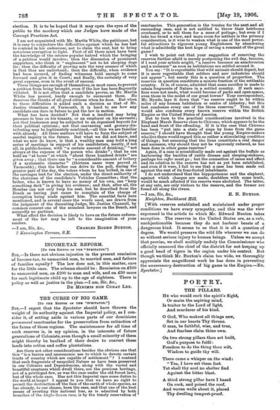THE CURSE OF BIG GAME. [TO THE EDITOR 01 THE
"SPECTATOR."] SIR,—I regret that the Spectator should have thrown the weight of its authority against the Imperial policy, as I con- sider it, of setting aside in various parts of our dominions permanent sanctuaries for the preservation from extinction of
the fauna of those regions. The maintenance for all time of such reserves is, in my opinion, in the interests of future generations of Colonists, even though a small minority of them might thereby be baulked of their desire to convert these lands into cotton and coffee plantations.
Are there not other considerations besides the obvious one that this "is a barren and uneconomic use to which to devote certain tracts of country which are capable of settlement " ? I contend that such fragments of unspoiled Nature as have been preserved in our Colonies and Dependencies, along with the varied and beautiful creatures which dwell there, are the precious heritage, not of a privileged few, as was the case under the old forest laws, but of the whole race. Has not this Imperial race some duties to the world at large ? I appeal to you that we have no right to permit the destruction off the face of the earth of whole species, as has already, to our shame, been the case, and that one of the best means of averting this national loss, as is admitted by both branches of the Anglo-Saxon race, is by the timely reservation of
sanctuaries. This generation is the trustee for the next and all succeeding ones, and is not entitled to throw their heirlooms overboard, or to sell them for a mess of pottage; but even if I take too broad a view, and more room for settlers is the primary consideration, is it wise to weaken what is one of the most power- ful attractions to vigorous young Englishmen by abandoning what is admittedly the best hope of saving a remnant of the great game ?
I wish to point out that your suggestion of removing tho reserves further afield is merely postponing the evil day, because, if I read your article aright, " a reserve becomes an anachronism and a nuisance" as soon as habitations are settled around it.
You say: "It is regrettable that wild animals should depart, but it is more regrettable that settlers and new industries should not appear"; but surely this is a question of proportion. The reserves in question constitute a minute fraction of the settleable country. It is, of course, admitted that some sacrifice is made to retain fragments of Nature in a settled country. If such sacri- fices were not made, what would become of parks and open spaces, even those in the midst of our great towns ? Your correspondent, Mr. Hynde, lays it down that "no reserve ought to be within miles of any human habitation or centre of industry; but this test condemns every one of the three reserves." True, and it would also condemn every known reserve within the British Empire or the United States of America.
But to turn to the practical considerations involved in the Elephant Marsh Reserve close to Chiroino, which appears to be the head and front of the offending. If it is the case that Chiromo has been " put into a state of siege by lions from the game reserve," I should have thought that the young Empire-makers who live there would regard this as rather a stimulating condition of things ; but assuming that the lions constitute a real danger and nuisance, why should they not be vigorously reduced, as has been done in other game reserves ?
Again, if a case is scientifically made out against the buffalo as harbouring the bacillus of cattle disease and sleeping-sickness, perhaps boa caffer must go ; but the connection of cause and effect and its relation to the reserve has not as yet been established, and even if it were, I fail to see that a case has been made out against the rest of its four-footed inhabitants.
I do not understand that the hippopotamus and the elephant, against which charges are made, doubtless with some truth, would be much affected if the reserve were abolished. The latter, at any rate, are only visitors to the reserve, and the former are found all along the rivers.
Knighton, Buckhurst Hill.
[With reserves established and maintained under proper conditions we have every sympathy, and this was the view expressed in the article to which Mr. Edward Buxton takes exception. The reserves in the United States are, as a rule, unobjectionable because they do not harbour beasts of a dangerous kind. It seems to us that it is all a question of degree. We would preserve the wild life wherever we can do so without serious injury to human beings. Unless we accept that proviso, we shall multiply unduly the Commissioner who officially censured the chief of the district for not keeping up a good head of tigers in the region under his control. But though we think Mr. Buxton's claim too wide, we thoroughly appreciate the magnificent work he has done in preventing the unnecessary destruction of big game in the Empire.—En.
Spectator.]










































 Previous page
Previous page